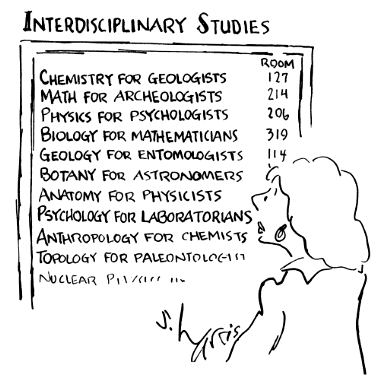Dr. Sarah Ray discusses in her article her experience developing the Environmental Studies major at Humboldt State University and the transformation to the curriculum she helped create. As one of her students I am very thankful of the knowledge she shared and the way she helped enhance my world perspective. Environmental Studies is a very interdisciplinary major. While most people take classes catered to their major we are offered a variety of subjects from environmental science to philosophy regarding sustainable practices. Some see this practice as robbing us of deep knowledge or understanding of the subject, but actually it enhances our understanding and helps us grasp the full extent of the problem.
 |
| What the diverse classes can feel like... |
Being able to see the big picture allows also for an understanding of other perspectives and ways of thinking. Our broadened knowledge allows us to break out of perceived barriers and better create lasting and appealing solutions to a larger variety of people. One of Dr. Ray's most important lessons is understanding the inherent privilege. To quote Ray, "Anguish, discomfort, shame, guilt, even apathy are all productive affects for decolonizing environmental studies". Realizing how our perspective of the world is influenced by our privilege allows us to have a critical lens into inequalities and social justice issues and how to better address accessibility problems in classes within society. In the end Ray wants E.S. students to deconstruct the everyday social problems and find unique and lasting solutions. In understanding privilege and social justice we can understand powers of influence and deconstruct the societal boxes of how to perceive an issue. The capstone service learning assignment is a way to test this understanding and finally apply it outside the academic setting.
The service learning assignment is a way for E.S. majors to take direct action and apply their knowledge to improve organizations in efforts for sustainability and accessibility. Getting a hands on experience for community change enhances learning and broadens our understanding of how to apply this knowledge to help the world, something Powerpoints lectures sorely lack. According to Dannielle Davis in their article Training Transformative Leaders Through Critical Service Learning, "The benefits of critical service-learning for the future of educational leadership emerge at the micro individual level, and a broader macro social level" and address issues of inequality and finally add their perspective to the decision making process. Creating change on an individual level creates ripples that resonate throughout the community. Impactful change comes form much work and a constant striving to improve our surroundings. By applying these perspectives of influence, privilege, social justice, and sustainability I don't doubt this service learning opportunity will create widespread positive change in the surrounding area and create lasting connections in its community members.
Overall the service learning experience when it is applied with Dr. Ray's critical lens on Environmental Studies and problem solving is an opportunity for great social change. As a current student I feel this experience will create many positive benefits to the community at large with such an influx in E.S. student involvement with social issues around the area. It allows for young fresh perspectives to be applied to social problems and grants them the experience of applying themselves outside of school in the real world setting. With the myriad of opportunities the service learning capstone class provides I am excited to see and map out the positive change and influence this year's class will provide to the people and businesses in this community.
No comments:
Post a Comment